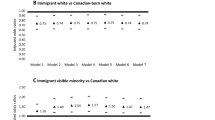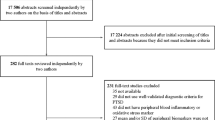Abstract
There have been few epidemiological studies exploring the link between PTSD and inflammation using population-based samples. This study examined the relation between posttraumatic stress disorder (PTSD) and inflammation-related medical conditions using data from the 2013–2014 New York City Health and Nutrition Examination Survey. Using a representative sample of 1,527 residents in New York City, the association between PTSD and 17 inflammation-related medical conditions were examined. Bivariate and multivariable analyses were conducted, adjusting for demographic characteristics and lifetime depression. PTSD was strongly associated with increased odds for hypercholesterolemia, insulin resistance, angina, heart attack, and emphysema with the greatest odds observed for heart attack (OR= 3.94) and emphysema (OR= 4.06). But PTSD was also associated with lower odds for hypertension, type 1 diabetes, asthma, coronary heart disease, stroke, osteoporosis, and a failing kidney with the lowest odds observed for type 1 diabetes (OR= 0.43). These findings suggest a complex link between PTSD and inflammation-related medical conditions.
Similar content being viewed by others
References
Brewin CR, Andrews B, Valentine JD. Meta-analysis of risk factors for posttraumatic stress disorder in trauma-exposed adults. J. Consult. Clin. Psychol. 2000;68(5):748–66.
Tsai J, Harpaz-Rotem I, Armour C, Southwick SM, Krystal JH, Pietrzak RH. Dimensional structure of DSM-5 posttraumatic stress disorder symptoms: Results from the National Health and Resilience in Veterans Study. Journal of Clinical Psychiatry. 2014;76(5):546–53.
Sledjeski EM, Speisman B, Dierker LC. Does number of lifetime traumas explain the relationship between PTSD and chronic medical conditions? Answers from the National Comorbidity Survey-Replication (NCS-R). J Behav Med. 2008;31(4):341–9. doi:10.1007/s10865-008-9158-3
Boscarino JA. Posttraumatic stress disorder and physical illness: results from clinical and epidemiologic studies. Ann N Y Acad Sci. 2004;1032:141–53. doi:10.1196/annals.1314.011
David D, Woodward C, Esquenazi J, Mellman TA. Comparison of comorbid physical illnesses among veterans with PTSD and veterans with alcohol dependence. Psychiatr Serv. 2004;55(1):82–5. doi:10.1176/appi.ps.55.1.82
Spitzer C, Barnow S, Volzke H, John U, Freyberger HJ, Grabe HJ. Trauma, posttraumatic stress disorder, and physical illness: findings from the general population. Psychosom Med. 2009;71(9):1012–7. doi:10.1097/PSY.0b013e3181bc76b5
Sareen J, Cox BJ, Stein MB, Afifi TO, Fleet C, Asmundson GJ. Physical and mental comorbidity, disability, and suicidal behavior associated with posttraumatic stress disorder in a large community sample. Psychosom Med. 2007;69(3):242–8. doi:10.1097/PSY.0b013e31803146d8
von Känel R, Hepp U, Kraemer B, Traber R, Keel M, Mica L, et al. Evidence for low-grade systemic proinflammatory activity in patients with posttraumatic stress disorder. Journal of Psychiatric Research. 2007;41(9):744–52.
Spitzer C, Barnow S, Völzke H, Wallaschofski H, John U, Freyberger HJ, et al. Association of posttraumatic stress disorder with low-grade elevation of C-reactive protein: Evidence from the general population. Journal of Psychiatric Research. 2010;44(1):15–21.
Gola H, Engler H, Sommershof A, Adenauer H, Kolassa S, Schedlowski M, et al. Posttraumatic stress disorder is associated with an enhanced spontaneous production of pro-inflammatory cytokines by peripheral blood mononuclear cells. BMC psychiatry. 2013;13:40.
von Känel R, Begré S, Abbas CC, Saner H, Gander ML, Schmid JP. Inflammatory biomarkers in patients with posttraumatic stress disorder caused by myocardial infarction and the role of depressive symptoms. Neuroimmunomodulation. 2009;17(1):39–46.
Plantinga L, Bremner JD, Miller AH, Jones DP, Veledar E, Goldberg J, et al. Association between posttraumatic stress disorder and inflammation: A twin study. Brain Behav Immun. 2013;30:125–32. doi:10.1016/j.bbi.2013.01.081
Baker DG, Nievergelt CM, O'Connor DT. Biomarkers of PTSD: neuropeptides and immune signaling. Neuropharmacology. 2012;62(2):663–73. doi:10.1016/j.neuropharm.2011.02.027
Tsigos C, Chrousos GP. Hypothalamic–pituitary–adrenal axis, neuroendocrine factors and stress. Journal of Psychosomatic Research. 2002;53(4):865–71.
De Kloet CS, Vermetten E, Geuze E, Kavelaars A, Heijnen CJ, Westenberg HG. Assessment of HPA-axis function in posttraumatic stress disorder: Pharmacological and non-pharmacological challenge tests, a review. Journal of psychiatric research. 2006;40(6):550–67.
Geracioti TD, Jr., Baker DG, Ekhator NN, West SA, Hill KK, Bruce AB, et al. CSF norepinephrine concentrations in posttraumatic stress disorder. Am J Psychiatry. 2001;158(8):1227–30. doi:10.1176/appi.ajp.158.8.1227
Sautter FJ, Bissette G, Wiley J, Manguno-Mire G, Schoenbachler B, Myers L, et al. Corticotropin-releasing factor in posttraumatic stress disorder (PTSD) with secondary psychotic symptoms, nonpsychotic PTSD, and healthy control subjects. Biol Psychiatry. 2003;54(12):1382–8.
Skelton K, Ressler KJ, Norrholm SD, Jovanovic T, Bradley-Davino B. PTSD and gene variants: new pathways and new thinking. Neuropharmacology. 2012;62(2):628–37. doi:10.1016/j.neuropharm.2011.02.013
Thorpe LE, Greene C, Freeman A, Snell E, Rodriguez-Lopez JS, Frankel M, et al. Rationale, design and respondent characteristics of the 2013-2014 New York City Health and Nutrition Examination Survey (NYC HANES 2013-2014). Prev Med Rep. 2015;2:580–5. doi:10.1016/j.pmedr.2015.06.019
U.S. Census Bureau. American Community Survey. U.S. Census Bureau, Washington, DC. 2013. http://www.census.gov/acs/www/data/data-tables-and-tools/data-profiles/2013/. Accessed December 10 2016.
Marchesi C, Paradis P, Schiffrin EL. Role of the renin-angiotensin system in vascular inflammation. Trends Pharmacol Sci. 2008;29(7):367–74. doi:10.1016/j.tips.2008.05.003
Duarte MM, Rocha JB, Moresco RN, Duarte T, Da Cruz IB, Loro VL, et al. Association between ischemia-modified albumin, lipids and inflammation biomarkers in patients with hypercholesterolemia. Clin Biochem. 2009;42(7–8):666–71. doi:10.1016/j.clinbiochem.2009.01.010
Willerson JT, Ridker PM. Inflammation as a cardiovascular risk factor. Circulation. 2004;109(21 Suppl 1):II2–10. doi:10.1161/01.CIR.0000129535.04194.38
Hoidal JR, Niewoehner DE. Pathogenesis of emphysema. Chest. 1983;83(4):679–85.
Lindsberg PJ, Grau AJ. Inflammation and infections as risk factors for ischemic stroke. Stroke. 2003;34(10):2518–32. doi:10.1161/01.STR.0000089015.51603.CC
Hardy R, Cooper MS. Bone loss in inflammatory disorders. J Endocrinol. 2009;201(3):309–20. doi:10.1677/JOE-08-0568
Oberg BP, McMenamin E, Lucas FL, McMonagle E, Morrow J, Ikizler TA, et al. Increased prevalence of oxidant stress and inflammation in patients with moderate to severe chronic kidney disease. Kidney Int. 2004;65(3):1009–16. doi:10.1111/j.1523-1755.2004.00465.x
Colotta F, Allavena P, Sica A, Garlanda C, Mantovani A. Cancer-related inflammation, the seventh hallmark of cancer: links to genetic instability. Carcinogenesis. 2009;30(7):1073–81. doi:10.1093/carcin/bgp127
Donath MY, Shoelson SE. Type 2 diabetes as an inflammatory disease. Nature Reviews Immunology. 2011;11(2):98–107.
Eizirik DL, Colli ML, Ortis F. The role of inflammation in insulitis and β-cell loss in type 1 diabetes. Nature Reviews Endocrinology. 2009;5(4):219–26.
Mundy GR. Osteoporosis and inflammation. Nutrition reviews. 2007;65(suppl 3):S147-S51.
Rosmond R, Björntorp P. The hypothalamic–pituitary–adrenal axis activity as a predictor of cardiovascular disease, type 2 diabetes and stroke. Journal of Internal Medicine. 2000;247(2):188–97.
Stewart JC, Rand KL, Muldoon MF, Kamarck TW. A prospective evaluation of the directionality of the depression–inflammation relationship. Brain, behavior, and immunity. 2009;23(7):936–44.
Shimbo D, Chaplin W, Crossman D, Haas D, Davidson KW. Role of depression and inflammation in incident coronary heart disease events. American Journal of Cardiology. 2005;96(7):1016–21.
Dandona P, Aljada A, Bandyopadhyay A. Inflammation: the link between insulin resistance, obesity and diabetes. Trends in immunology. 2004;25(1):4–7.
Acknowledgements
We thank the CUNY School of Public Health and NYC Department of Health for their development of the NYC HANES initiative.
Author information
Authors and Affiliations
Corresponding author
Ethics declarations
Funding
There was no direct funding for this study.
Conflict of Interest
Dr. Tsai and Mr. Shen declares that they have no conflict of interest with this work.
Ethical Approval
All procedures performed in studies involving human participants were in accordance with the ethical standards of the institutional and/or national research committee and with the 1964 Helsinki declaration and its later amendments or comparable ethical standards.
Informed Consent
Informed consent was obtained from all individual participants included in the study by the original principal investigators of the NYC HANES initiative.
Rights and permissions
About this article
Cite this article
Tsai, J., Shen, J. Exploring the Link Between Posttraumatic Stress Disorder and inflammation-Related Medical Conditions: An Epidemiological Examination. Psychiatr Q 88, 909–916 (2017). https://doi.org/10.1007/s11126-017-9508-9
Published:
Issue Date:
DOI: https://doi.org/10.1007/s11126-017-9508-9




